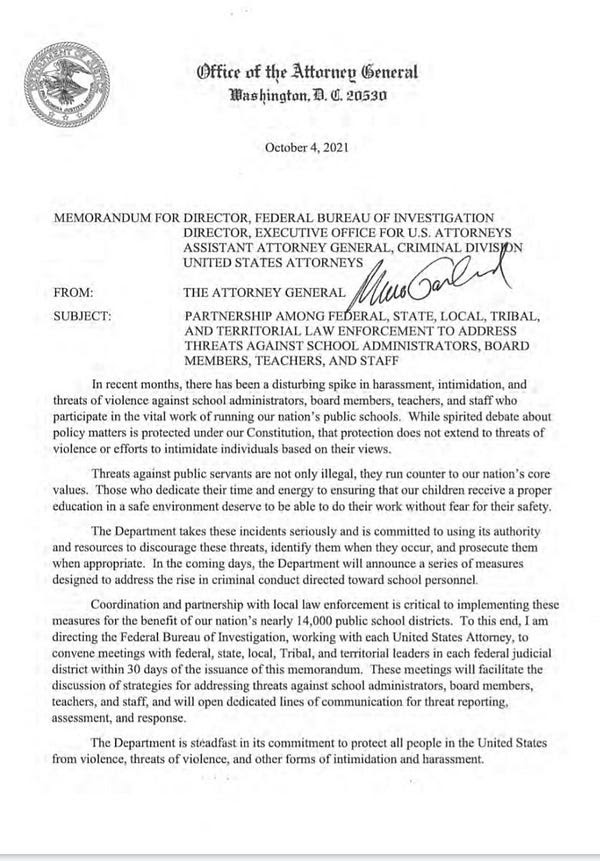There are times when you feel like you have to write obvious things. Here’s one: Both sides of the political spectrum should loudly and unequivocally condemn stalking and harassment of elected officials and private citizens.
Here’s another: Both sides of the political spectrum should support police protection for threatened citizens and vigorous prosecution of unlawful threats or attacks.
And for goodness sakes, can we not first waste time debating “which side is worse” before we set some basic principles and basic parameters? The partisan posture all too often goes something like this: “I will take you seriously only so long as you acknowledge that my side is mostly right, and the other side is mostly wrong.”
How about this: Let’s call out, condemn, and prosecute (if appropriate) threats and harassment whenever they occur, wherever they occur, and then make partisan judgments accordingly. It is not hard one day to condemn arguments like this:

Jezebel @Jezebel
Absolutely Bully Kyrsten Sinema Outside Of Her Bathroom Stall dlvr.it/S8vg0w
October 4th 2021
175 Retweets1,469 Likes
And then, the very next day, condemn the actions here:
If the independently obvious morality of the defense of decency and personal security isn’t enough, there are three additional reasons why it is increasingly imperative for the sensible, peaceful majority to make its voice heard.
First, we’re playing with fire. As I wrote at
length on Sunday, American polarization is reaching a dangerous point. A University of Virginia poll found that a majority of Trump voters (52 percent) support splitting the nation. A strong minority of Biden voters (41 percent) feel the same way. Moreover, as I’ve written
time and
time again, escalating political rhetoric and escalating threats are often precursors to violent action. After the summer of 2020 and the events of January 6, who doubts that America faces a threat of pervasive political violence?
Personal confrontations are inherently tense. Trigger personal confrontations against the backdrop of increasing public unease, and you ratchet up the tension. The result is a tinderbox. Personal harassment places ordinary men and women in extraordinary situations, often without adequate personal protection. This means that social peace can hinge on the hope that furious protesters or embattled citizens make appropriate snap judgments that calm each individual storm.
It is profoundly wrong and foolish beyond measure to make another person fear for his safety or the safety of his family. You cannot predict or control the reaction of a person who believes they are under mortal threat.
Second, we’re deterring decent people from public service. Writing in
The Week, Joel Mathis
stated the problem well:
The democratic process starts at the local level. There are many little-known and ill-paid elected local officials whose motivations have little to do with ideology or ambition. They simply have a desire for public service. Very few of these people get rich or powerful on the school board, but they do give a lot of time and energy to serve. Attempts to intimidate them in their work or scare them away from pursuing office altogether erode American democracy at a fundamental level.
Community by community, American democracy works in large part because countless thousands of our fellow citizens choose to dedicate immense amounts of time at relatively low levels of pay (or sometimes for no pay at all) to serve at the lowest levels of governments. They should not be immune from critique. Every person who enters public service should be prepared to face the public.
But there is a vast difference between vigorous debate and outright harassment, much less threats of violence. If that is perceived to be the price of admission into public office, we will see a diminishing number of responsible citizens choose to subject themselves or their families to relentless abuse.
Third, we’re systematically inflicting profound moral injuries on our fellow citizens. I speak from experience when I tell you this—there are few things more demoralizing or dispiriting than sharing a story of personal threat and harassment, only to be greeted with rationalization or indifference. Spend five seconds in online spaces, and you will realize that all too many of your fellow citizens are going to sleep at night afraid for their safety, and a huge portion of the country either does not care or positively delights in their suffering.
If you don’t think indifference or rationalization drives polarization, then think again. If you face bullying and harassment, you will run into the arms of those who extend themselves to you. It’s often a matter of sheer emotional and intellectual self-preservation.
Another way to put this, is that cruelty rarely “works” to achieve its objective (for example, bullying an elected official into submission), but it always inflicts a cost. And for the cruel, that is more than enough justification to maintain the abuse. For the cruel, a campaign of harassment is a win/win. You can maybe, possibly make your enemy yield, but even if you don’t, you can make your enemy afraid. You can disrupt their lives.
There is simply a shocking lack of empathy in the public square. Last week, the National School Boards Association
wrote the Biden administration requesting “immediate assistance” to protect “students, school board members, and educators” from threats of violence. Their letter listed a number of disturbing incidents nationwide, some of which implicated federal law.
Such incidents are taking place across the country. Imagine serving in a school board and hearing this:
Imagine testifying in support of masks in your local schools and experiencing threats like this:
But yesterday in parts of the right-wing world the real outrage was that the Biden Department of Justice issued a rather anodyne letter that 1) affirmed the right to engage in “spirited debate,” 2) observed that “threats against public servants are illegal” and should be prosecuted “when appropriate,” and 3) promised to “convene meetings” with local law enforcement to discuss “strategies for addressing threats” against students and school personnel.
Here was a hyperbolic response:
Any time law enforcement ramps up its efforts in virtually any arena of public safety, there is a risk of abuse (that’s one reason why I steadfastly support ending qualified immunity—law enforcement should be mindful of civil liberties in every context). At the same time, we know that the threat environment is increasingly troubling. And how many school board members can afford enhanced personal security?
We cannot be
empathetic only to our allies. We cannot allow fear of law enforcement excess to deprive fellow citizens of the
protection they need. And we have to recognize both that threats and harassment are always wrong and that in our present moment they’re especially dangerous. Our nation is playing with fire. It’s imperative that it stop now, or the angry and the cruel will ignite a blaze that we cannot contain.
 Jezebel @Jezebel
Jezebel @Jezebel
 Ron Filipkowski @RonFilipkowski
Ron Filipkowski @RonFilipkowski Iowa Starting Line @IAStartingLine
Iowa Starting Line @IAStartingLine The Tennessee Holler @TheTNHoller
The Tennessee Holler @TheTNHoller Christopher F. Rufo
Christopher F. Rufo  @realchrisrufo
@realchrisrufo
 Listen Online
Listen Online Watch Online
Watch Online Find a Station in Your Area
Find a Station in Your Area




 WILLIAMSON COUNTY ANTI-MASKERS: “We know who you are! We will find you! You’ll never be allowed in public again!” A doctor who testified for a mask mandate is hassled and threatened on the way out. (FULL @formvscontent @WilliamsonHmPg VIDEO: )
WILLIAMSON COUNTY ANTI-MASKERS: “We know who you are! We will find you! You’ll never be allowed in public again!” A doctor who testified for a mask mandate is hassled and threatened on the way out. (FULL @formvscontent @WilliamsonHmPg VIDEO: )




 Listen Now
Listen Now Watch Online
Watch Online
